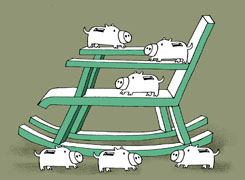Ramalingam Kalirajan |10030 Answers |Ask -Follow
Mutual Funds, Financial Planning Expert - Answered on Apr 12, 2024
He has an MBA in finance from the University of Madras and is a certified financial planner.
He is the director and chief financial planner at Holistic Investment, a Chennai-based firm that offers financial planning and wealth management advice.... more

Hi guruji, I am 58 yr. I have 30 lakh in MF ,and 85 K monthly SIP also have 6 l in F.D. I get 24 l per annum in a private sector. I don't get any retirement benefits from the company. I want to work for 3 more years . I have HDFC optima secure medical policy for 20 lakhs. My children are settled and I own a flat and no loans. My monthly expenses now are 50k. How much do I need as retirement corpus. Please sugges me how much more is to be saved and ways of doing
Estimate Retirement Expenses: Calculate your estimated monthly expenses after retirement. Since your current expenses are 50k per month, consider any changes in expenses after retirement, such as healthcare costs and leisure activities.
Calculate Retirement Corpus: Multiply your estimated annual expenses by the number of years you expect to live post-retirement. Assuming a lifespan of 85 years and a retirement age of 61, you would need a retirement corpus to cover expenses for around 24 years.
Consider Inflation: Adjust your retirement corpus for inflation to ensure that your savings retain their purchasing power over time.
Assess Current Savings: Evaluate your current savings and investments, including MFs, FDs, and SIPs. Determine how much these assets are expected to grow by the time you retire.
Identify Shortfall: Compare your estimated retirement corpus with your current savings to identify any shortfall.
Increase Savings: If there's a shortfall, consider increasing your monthly SIP contributions or exploring other investment options to bridge the gap. You may also consider delaying retirement by a few years to allow your investments more time to grow.
Review Insurance: Ensure that your medical insurance coverage is adequate for your needs post-retirement. Consider any additional insurance policies or riders that may be necessary.
Consult a Financial Advisor: It's advisable to consult a financial advisor who can provide personalized guidance based on your specific financial situation and goals. They can help you develop a comprehensive retirement plan and suggest suitable investment strategies to achieve your objectives.
You may like to see similar questions and answers below
Sanjeev Govila | Answer |Ask -Follow
Financial Planner - Answered on Nov 15, 2023
Ramalingam Kalirajan |10030 Answers |Ask -Follow
Mutual Funds, Financial Planning Expert - Answered on May 18, 2024
Ramalingam Kalirajan |10030 Answers |Ask -Follow
Mutual Funds, Financial Planning Expert - Answered on May 30, 2024
Ramalingam Kalirajan |10030 Answers |Ask -Follow
Mutual Funds, Financial Planning Expert - Answered on Aug 08, 2024
Ramalingam Kalirajan |10030 Answers |Ask -Follow
Mutual Funds, Financial Planning Expert - Answered on Sep 09, 2024
Radheshyam Zanwar |6049 Answers |Ask -Follow
MHT-CET, IIT-JEE, NEET-UG Expert - Answered on Aug 01, 2025
Ramalingam Kalirajan |10030 Answers |Ask -Follow
Mutual Funds, Financial Planning Expert - Answered on Aug 01, 2025
Patrick Dsouza |1351 Answers |Ask -Follow
CAT, XAT, CMAT, CET Expert - Answered on Aug 01, 2025
Nayagam P P |9770 Answers |Ask -Follow
Career Counsellor - Answered on Aug 01, 2025
Radheshyam Zanwar |6049 Answers |Ask -Follow
MHT-CET, IIT-JEE, NEET-UG Expert - Answered on Aug 01, 2025
Ramalingam Kalirajan |10030 Answers |Ask -Follow
Mutual Funds, Financial Planning Expert - Answered on Aug 01, 2025
Radheshyam Zanwar |6049 Answers |Ask -Follow
MHT-CET, IIT-JEE, NEET-UG Expert - Answered on Aug 01, 2025
Nayagam P P |9770 Answers |Ask -Follow
Career Counsellor - Answered on Aug 01, 2025
Nayagam P P |9770 Answers |Ask -Follow
Career Counsellor - Answered on Aug 01, 2025
Ramalingam Kalirajan |10030 Answers |Ask -Follow
Mutual Funds, Financial Planning Expert - Answered on Aug 01, 2025













.jpg)







